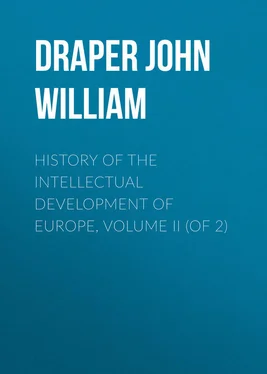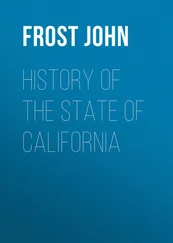John Draper - History of the Intellectual Development of Europe, Volume II (of 2)
Здесь есть возможность читать онлайн «John Draper - History of the Intellectual Development of Europe, Volume II (of 2)» — ознакомительный отрывок электронной книги совершенно бесплатно, а после прочтения отрывка купить полную версию. В некоторых случаях можно слушать аудио, скачать через торрент в формате fb2 и присутствует краткое содержание. Жанр: foreign_antique, foreign_prose, на английском языке. Описание произведения, (предисловие) а так же отзывы посетителей доступны на портале библиотеки ЛибКат.
- Название:History of the Intellectual Development of Europe, Volume II (of 2)
- Автор:
- Жанр:
- Год:неизвестен
- ISBN:нет данных
- Рейтинг книги:4 / 5. Голосов: 1
-
Избранное:Добавить в избранное
- Отзывы:
-
Ваша оценка:
- 80
- 1
- 2
- 3
- 4
- 5
History of the Intellectual Development of Europe, Volume II (of 2): краткое содержание, описание и аннотация
Предлагаем к чтению аннотацию, описание, краткое содержание или предисловие (зависит от того, что написал сам автор книги «History of the Intellectual Development of Europe, Volume II (of 2)»). Если вы не нашли необходимую информацию о книге — напишите в комментариях, мы постараемся отыскать её.
History of the Intellectual Development of Europe, Volume II (of 2) — читать онлайн ознакомительный отрывок
Ниже представлен текст книги, разбитый по страницам. Система сохранения места последней прочитанной страницы, позволяет с удобством читать онлайн бесплатно книгу «History of the Intellectual Development of Europe, Volume II (of 2)», без необходимости каждый раз заново искать на чём Вы остановились. Поставьте закладку, и сможете в любой момент перейти на страницу, на которой закончили чтение.
Интервал:
Закладка:
Political results of the Crusades.It had been expected by the politicians who first projected these wars that they would heal the divisions of the Latin and Greek churches, and give birth to a European republic, under the spiritual presidency of the pope. In these respects they proved a failure. It does not appear that the popes themselves personally had ever any living faith in the result. Not one of them ever joined a crusade; and the Church, as a corporation, took care to embark very little money in these undertakings. But, though they did not answer to the original intention, they gave, in an indirect way, a wonderful stimulus to the papal power. Give to Rome the control of men and money in Europe.Under the plausible pretences offered by them, the pope obtained control over the person of every Christian man from the highest to the lowest. The cross once taken, all civil control over the Crusader ceased – he became the man of the Church. Under those pretences, also, a right was imperceptibly acquired of raising revenue in all parts of Europe; even the clergy might be assessed. A drain was thus established on the resources of distant nations for an object which no man dared to gainsay; if he adventured on any such thing, he must encounter the odium of an infidel – an atheist. A steady stream of money flowed into Italy. Nor was it alone by this taxation of every Christian nation without permission of its government – this empire within every empire – immense wealth accrued to the projectors, while the infatuation could be kept up, by the diminished rate at which land could be obtained. Domains were thrown into the market; there were few purchasers except the Church. Immense domains were also given away by weak-minded sinners, and those on the point of death, for the salvation of their souls. Thus, all things considered, the effect of the Crusades, though not precisely that which was expected, was of singular advantage to the Church, giving it a commanding strength it had never before possessed.
In their resistance to the German attack the popes never hesitated at any means. They prompted Prince Henry to revolt against their great antagonist, his father; they intervened, not to rebuke, but to abet him, when he threw his father into prison and deprived him of the necessaries of life. They carried their vengeance beyond the grave. When the aged emperor, broken in heart, escaped from their torment, and was honourably buried by the Bishop of Liège, that prelate was forthwith excommunicated and compelled to disinter the corpse. But crimes like these, against which human nature revolts, meet with retribution. Resistance of Henry V.This same Prince Henry, becoming Henry V., was forced by circumstances to resume his father's quarrel, and to refuse to yield his right of granting investitures. He marched upon Rome, and at the point of the sword compelled his adversary, Pope Paschal II., to surrender all the possessions and royalties of the Church – compelled him to crown him emperor – not, however, until the pontiff had been subjected to the ignominy of imprisonment, and brought into condemnation among his own party.
Bernard of Clairvaux stimulates the second crusade.Things seemed to be going to ruin in Rome, and such must inevitably have been the issue, had not an extraneous influence arisen in Bernard of Clairvaux, to whom Europe learned to look up as the beater down of heresies, theological and political. He had been a pupil of William of Champeaux, the vanquished rival of Abelard, and Abelard he hated with a religious and personal hate. He was a wonder-worker. He excommunicated the flies which infested a church – they all fell down dead and were swept out by the basketful. He has been described as "the mellifluous doctor, whose works are not scientific, but full of unction." He could not tolerate the principle at the basis of Abelard's philosophy – the assertion of the supremacy of reason. Of Arnold of Brescia – who carried that principle to its political consequences, and declared that the riches and power of the clergy were inconsistent with their profession – he was the accuser and punisher. Its failure.Bernard preached a new crusade, authenticating his power by miracles, affirmed to be not inferior to those of our Saviour; promising to him who should slay an unbeliever happiness in this life and Paradise in the life to come. This second crusade was conducted by kings, and included fanatic ladies, dressed in the armour of men; but it ended in ruin.
It was reserved for the only Englishman who ever attained to the papacy to visit Rome with the punishment she had so often inflicted upon others. Nicolas Breakspear – Adrian IV. – put the Eternal City under interdict, thereby ending the republic which the partisans of Arnold of Brescia had set up. But in this he was greatly aided by a change of sentiment in many of the inhabitants of Rome, who had found to their cost that it was more profitable for their city to be the centre of Christianity than the seat of a phantom republic. Murder of Arnold of Brescia.As an equivalent for his coronation by Adrian, Frederick Barbarossa agreed to surrender to the Church Arnold of Brescia. With indecent haste, the moment she had obtained possession of her arch-enemy she put him to death – not delivering him over to the secular arm, as the custom had been, but murdering him with her own hand. Seven centuries have elapsed, and the blood of Arnold is still crying from the ground for retribution. Notwithstanding a new – the third – crusade, things went from bad to worse in the Holy Land. Saladin had retaken Jerusalem, A.D. 1187. Barbarossa was drowned in a river in Pisidia. Richard of England was treacherously imprisoned; nor did the pope interfere for this brave soldier of the Cross. Birth of Frederick II.In the meantime, the Emperors of Germany had acquired Sicily by marriage – an incident destined to be of no little importance in the history of Europe; for, on the death of the Emperor Henry VI. at Messina, his son Frederick, an infant not two years old, was left to be brought up in that island. What the consequences were we shall soon see.
Review of the preceding events.If we review the events related in this chapter, we find that the idolatry and immorality into which Rome had fallen had become connected with material interests sufficiently powerful to ensure their perpetuation; that converted Germany insisted on a reform, and therefore made a moral attack on the Italian system, attempting to carry it into effect by civil force. This attack was, properly speaking, purely moral, the intellectual element accompanying it being derived from Western or Arabian influences, as will be shown in the next chapter; and, in its resistance to this, the papacy was not only successful, but actually was able to retaliate, overthrowing the Emperors of Germany, and being even on the point of establishing a European autocracy, with the pope at its head. It was in these events that the Reformation began, though circumstances intervened to postpone its completion to the era of Luther. Henceforth we see more and more plainly the attitude in which the papacy, through its material interests, was compelled to stand, as resisting all intellectual advancement. Our subject has therefore here to be left unfinished until we shall have described the Mohammedan influences making pressures on the West and the East.
CHAPTER II
THE AGE OF FAITH IN THE WEST – ( Continued )
THE WESTERN OR INTELLECTUAL ATTACK ON THE ITALIAN SYSTEM
The intellectual Condition of Christendom contrasted with that of Arabian Spain.
Diffusion of Arabian intellectual Influences through France and Sicily. – Example of Saracen Science in Alhazen, and of Philosophy in Algazzali. – Innocent III. prepares to combat these Influences. – Results to Western Europe of the Sack of Constantinople by the Catholics.
Читать дальшеИнтервал:
Закладка:
Похожие книги на «History of the Intellectual Development of Europe, Volume II (of 2)»
Представляем Вашему вниманию похожие книги на «History of the Intellectual Development of Europe, Volume II (of 2)» списком для выбора. Мы отобрали схожую по названию и смыслу литературу в надежде предоставить читателям больше вариантов отыскать новые, интересные, ещё непрочитанные произведения.
Обсуждение, отзывы о книге «History of the Intellectual Development of Europe, Volume II (of 2)» и просто собственные мнения читателей. Оставьте ваши комментарии, напишите, что Вы думаете о произведении, его смысле или главных героях. Укажите что конкретно понравилось, а что нет, и почему Вы так считаете.












